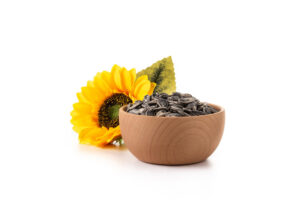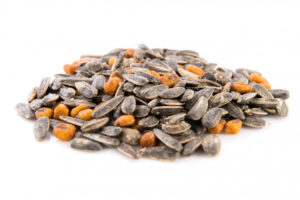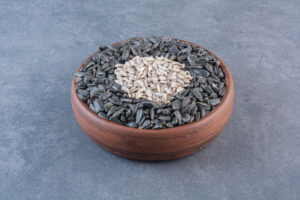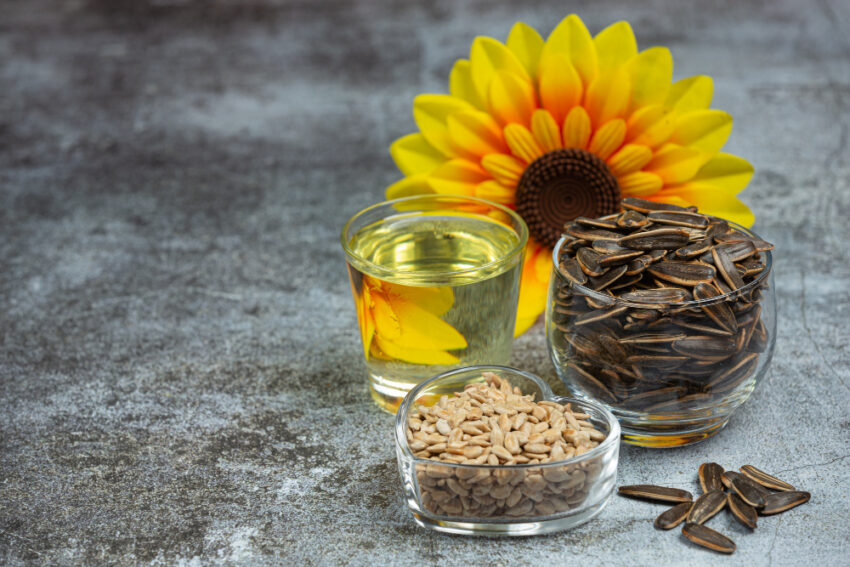Sunflower seeds are not only yummy but also packed with good stuff for your body. In this easy guide, we’ll discuss how to eat sunflower seeds, the benefits and potential side effects, who should munch on them, who should be cautious, and how to seamlessly add these little powerhouses into your diet.

Table of Contents
The Benefits of Sunflower Seeds
Before we get into how to eat sunflower seeds, let’s check out why they’re fantastic:
Loaded with Nutrients: Sunflower seeds are like tiny treasure chests filled with vitamins and minerals, such as vitamin E, magnesium, and selenium.
Heart-Friendly: These seeds have healthy fats that can help lower bad cholesterol, keeping your heart happy.
Fight Oxidative Stress: Packed with antioxidants like vitamin E and selenium, sunflower seeds help protect your cells from damage.
Protein Punch: With about 6 grams of protein per ounce, they’re an excellent plant-based protein source for vegans and vegetarians.
Gut-Friendly Fiber: The fiber in sunflower seeds aids digestion and keeps you feeling full longer.
Glowing Skin and Hair: The vitamin E in these seeds can give your skin and hair a boost, helping them look healthy and radiant.

How to Eat Sunflower Seeds
Let’s break down the easy steps on how to eat sunflower seeds:
Pick Your Seeds: You can find sunflower seeds in different forms, like in-shell, shelled, roasted, or flavored. Choose the type you like.
Crack the Shell (If It’s In-Shell): If you have in-shell sunflower seeds, gently crack them open with your teeth or a nutcracker. Remove any stray shell bits.
Position the Seed: Hold the seed between your thumb and finger, pointy end facing out.
Crack Open the Shell: Bite down or use your teeth to crack the shell without hurting the seed inside.
Get the Seed Out: Use your fingers to split the shell and reveal the tasty seed inside. It should pop out easily.
Toss the Shells: Put the empty shell pieces in a separate container or napkin.
Enjoy Your Seed: Eat the seed, savoring its mild, nutty flavor. Repeat for more.
Who Should Snack on Sunflower Seeds?
Sunflower seeds can be a healthy snack for many people, including:
Health Buffs: If you love nutritious snacks that give your body essential vitamins, minerals, and good fats.
Vegans and Vegetarians: These seeds are perfect for plant-based protein and healthy fats.
Heart Health Conscious: Sunflower seeds’ unsaturated fats can help lower cholesterol and reduce heart disease risk.
Beauty Enthusiasts: Vitamin E supports radiant skin and hair, so these seeds are a tasty way to enhance your beauty routine.

Who Should Be Cautious?
While sunflower seeds are great for most people, a few need to be careful:
Allergies: If you’re allergic to sunflower seeds or nuts, steer clear to avoid allergic reactions.
Watch Your Portions: Sunflower seeds are calorie-packed, so if you’re counting calories, be mindful of how much you eat.
Diverticulitis: If you have this condition, talk to your doctor before munching on seeds, as they might irritate your gut.
Protect Your Teeth: If you have dental problems, be gentle when cracking the seeds to avoid damaging your teeth.
Adding Sunflower Seeds to Your Diet
Here are some easy ways to include sunflower seeds in your meals:
Salad Sprinkle: Top your salads with shelled sunflower seeds for a crunchy kick and extra nutrition.
Smoothie Boost: Blend shelled seeds into your morning smoothie for a protein and nutrient boost.
Baking Magic: Add sunflower seeds to muffins, bread, or granola for flavor and nutrition.
Trail Mix Fun: Create a customized trail mix with sunflower seeds, nuts, dried fruits, and dark chocolate chips for a portable, energy-packed snack.
Nutty Butter: Make sunflower seed butter as a tasty and nut-free alternative to peanut or almond butter.

FAQs About Sunflower Seeds
Q1. Are sunflower seeds suitable for kids?
A1. Yes, sunflower seeds can be a healthy snack for children, but be cautious with younger kids to prevent choking. Opt for shelled seeds and supervise their consumption.
Q2. Can I eat sunflower seeds during pregnancy?
A2. Yes, sunflower seeds can provide essential nutrients during pregnancy. They are a good source of folate, magnesium, and healthy fats, but consult with your healthcare provider for personalized advice.
Q3. How can I store sunflower seeds to keep them fresh?
A3. Store sunflower seeds in an airtight container in a cool, dark place. This assists in preserving their quality and guarding against them becoming rancid.
Q4. Can sunflower seeds help with weight loss?
A4. Sunflower seeds can be a part of a weight-loss-friendly diet due to their fiber and protein content, which can help you feel full. However, monitor your portions, as they are calorie-dense.
Conclusion
In conclusion, how to eat sunflower seeds is easy and good for you. Whether you eat them as a quick snack, toss them into your meals, or try them in your favorite recipes, sunflower seeds can fit into many diets and lifestyles. Just remember to watch your portions and be cautious if you have allergies or specific health concerns. So go ahead, enjoy the nutty goodness of sunflower seeds, and reap the benefits of their nutrition.

